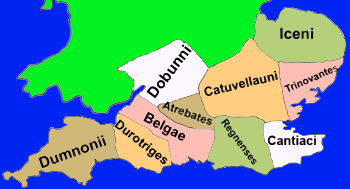Regnenses
| Regnenses | |
|---|---|
 | |
| Geography | |
| Capital | Noviomagus Reginorum (Chichester) |
| Location | Sussex Hampshire |
| Rulers | Tiberius Claudius Cogidubnus |
The Regnenses, Regni or Regini were a British Celtic kingdom and later a civitas of Roman Britain. Their capital was Noviomagus Reginorum, known today as Chichester in modern West Sussex.
The People of King Cogidubnus
Before the Roman conquest their land and capital appear to have been part of the territory of the Atrebates, possibly as part of a confederation of tribes. It has been suggested that, after the first phase of the conquest, the Romans maintained the Atrebates as a nominally independent client kingdom, acting as a buffer between the Roman province in the east and the unconquered tribes to the west. The ruler of the kingdom was Tiberius Claudius Cogidubnus: Tacitus says "quaedam civitates Cogidumno regi donatae (certain civitates were given to King Cogidubnus)"[1] and remarks on his loyalty. A 1st century inscription found in Chichester supplies his Latin names, indicating he was given Roman citizenship by Claudius or Nero. Cogidubnus may have been a relative of Verica, the Atrebatian king whose overthrow was the excuse for the conquest. After Cogidubnus's death, the kingdom would have been incorporated into the directly ruled Roman province and divided into several civitates, including the Atrebates, Belgae, and Regnenses.
Name
The name *Regnenses is a modern guess based on three actually observed names: Ptolemy 2,3,28 Ρηγνοι, people with one πολις at Νοιομαγος (usually guessed to mean Chichester); Ravenna Cosmography Navimago regentium (an unlocated place); and Antonine Itinerary Regno, at the end of iter 7 (possibly on the coast of the Solent).
The idea that there was a civitas with a Latin name meaning "people of the kingdom" (that is, a client kingdom, rather than the territories ruled directly by Roman officials) has attracted criticism. For example: "Even the reading of the genitive plural tribe name in Regnentium is a tendentious emendation ... To go further and turn all this into Regnenses, 'The People of the Kingdom', is more than rash ... The tribal name in Ptolemy is Regnoi, Rignoi, or Reginoi ... It is proposed ... that this was British Regini" (Jackson 1970).[2] "This is surely right" (Rivet & Smith 1979). "This...is the more acceptable" (Cunliffe 1973. p. 24), adding a comparison with Gaulish Regin or Old Welsh Regin, originating from a British word Regini meaning "the proud ones, the stiff ones".
Likewise, the theory that Cogidubnus was created legatus, a rank only ever given to senators, is based on reconstructing the damaged Chichester inscription to read as Cogidubni regis legati Augusti in Britannia ("king and imperial legate in Britain"). It more probably reads Cogidubni regis magni Britanniae ("great king of Britain") (Bogaers 1979).
References
^ "Civitates Cogidumno regi is interpreted as "people of the kingdom" in Latin.
^ Webster, Graham (2003). The Roman Invasion of Britain. Routledge. p. 188. ISBN 9781134601547..mw-parser-output cite.citation{font-style:inherit}.mw-parser-output .citation q{quotes:"""""""'""'"}.mw-parser-output .citation .cs1-lock-free a{background:url("//upload.wikimedia.org/wikipedia/commons/thumb/6/65/Lock-green.svg/9px-Lock-green.svg.png")no-repeat;background-position:right .1em center}.mw-parser-output .citation .cs1-lock-limited a,.mw-parser-output .citation .cs1-lock-registration a{background:url("//upload.wikimedia.org/wikipedia/commons/thumb/d/d6/Lock-gray-alt-2.svg/9px-Lock-gray-alt-2.svg.png")no-repeat;background-position:right .1em center}.mw-parser-output .citation .cs1-lock-subscription a{background:url("//upload.wikimedia.org/wikipedia/commons/thumb/a/aa/Lock-red-alt-2.svg/9px-Lock-red-alt-2.svg.png")no-repeat;background-position:right .1em center}.mw-parser-output .cs1-subscription,.mw-parser-output .cs1-registration{color:#555}.mw-parser-output .cs1-subscription span,.mw-parser-output .cs1-registration span{border-bottom:1px dotted;cursor:help}.mw-parser-output .cs1-ws-icon a{background:url("//upload.wikimedia.org/wikipedia/commons/thumb/4/4c/Wikisource-logo.svg/12px-Wikisource-logo.svg.png")no-repeat;background-position:right .1em center}.mw-parser-output code.cs1-code{color:inherit;background:inherit;border:inherit;padding:inherit}.mw-parser-output .cs1-hidden-error{display:none;font-size:100%}.mw-parser-output .cs1-visible-error{font-size:100%}.mw-parser-output .cs1-maint{display:none;color:#33aa33;margin-left:0.3em}.mw-parser-output .cs1-subscription,.mw-parser-output .cs1-registration,.mw-parser-output .cs1-format{font-size:95%}.mw-parser-output .cs1-kern-left,.mw-parser-output .cs1-kern-wl-left{padding-left:0.2em}.mw-parser-output .cs1-kern-right,.mw-parser-output .cs1-kern-wl-right{padding-right:0.2em}
Tacitus, Agricola 14- Bogaers, J. E. 1979. King Cogidubnus of Chichester: another reading of RIB 91. Britannia 10: 243-254.
- Cunliffe, Barry 1973. The Regni. Duckworth, Peoples of Roman Britain series.
- Jackson, K. 1970. Roman-British names in the Antonine itinerary. Britannia 1: 68-82.
- Rivet, A. L. F. & Smith, C. 1979. The Place-Names of Roman Britain.